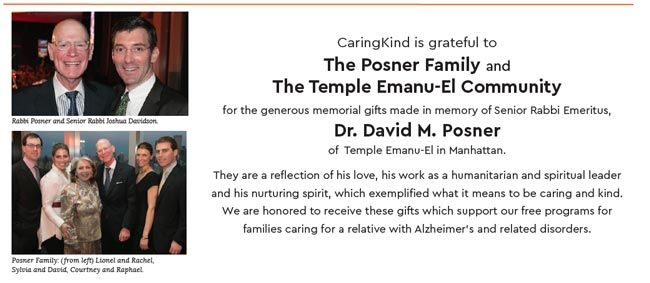Caring for the Caregiver
Dasha Kiper
Consulting Clinical Supervisor, Support Groups
At CaringKind, we make sure that spouses and adult children of people afflicted by Alzheimer’s and related dementias have a safe place to go where they can freely discuss their concerns with the people who understand them best: other caregivers. Because we recognize that the complicated nature of the disease often pushes caregivers to their limits while exposing old wounds in family dynamics, it is essential that support groups are led by highly skilled and knowledgeable group leaders.
Such leaders are not made overnight. Unlike other organizations, CaringKind spends days, rather than hours, informing trainees about the unique emotional challenges presented by the disease, and providing the clinical tools necessary to create a cohesive and emotionally supportive environment for caregivers who may be at the end of their rope.
“On the first day of training, I quietly said to myself, ‘Yes! This is it!’ The course was loving, warm, welcoming, compassionate, instructive, informative, and yes— supporting. I am extremely thankful that I was given the tools, skills, and understanding to be an effective support group leader— to constructively, compassionately, and safely support caregivers, who might be feeling hopeless,
disillusioned, frightened and saddened to their core.” - Joko Gilbert
Because the frustrating, contradictory, maddening nature of this illness makes so many caregivers feel their own minds unraveling even faster than their person’s their caring for, we often hear caregivers say, “People keep asking me about my husband. It’s always, ‘How is Frank?’ Let me tell you something, Frank is fine. It’s me, it’s all of us, who are going crazy.” Yes, taking care of spouses and parents with dementia takes its toll on caregivers’ sanity, identity, and even their ability to care for themselves.
Given what is at stake, the CaringKind Model recognizes that caring for the support group leader does not end after training. Therefore, CaringKind offers supervision sessions for over 80 support group leaders throughout the five boroughs. Being in direct contact with people experiencing and expressing anger, frustration, confusion, grief, and despair requires leaders to process difficult emotions. Supervision enables leaders to receive support and guidance from their peers and refine their clinical skills while creating a sense of community that helps our very best leaders stay engaged.
*“Monthly supervision has provided me with a safe place to share my experiences and to receive support from fellow group leaders. I could not do this work without having a place to honestly share my experiences and get helpful feedback from my peers and my supervision group leader. I, and, therefore, my group profit from such support.”
- Mike Koski *
The CaringKind model works. By investing in our support group leaders, we support the caregivers who come to us for help. Caregivers often say that support groups have saved their lives, their relationships, and their identities, while also imparting a sense of home. Creating such an environment takes time, it takes lengthy training, and it takes supervision. And, it is worth every drop of effort we put into it.

